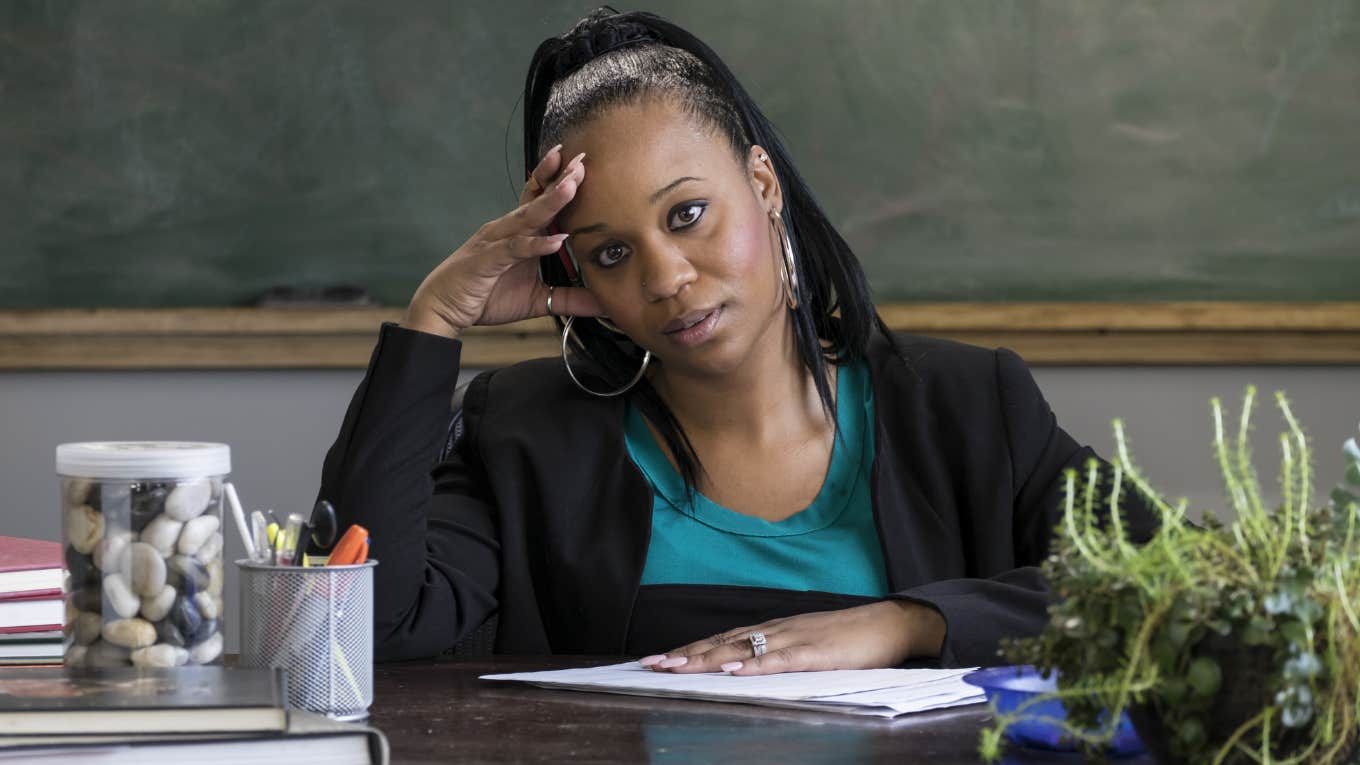Teacher Asks Why So Many More Parents Seem To Believe Anything Their Kids Say, Regardless Of How Absurd The Accusation
Don't they know their little angels frequently stretch the truth?
 Burlingham | Shutterstock
Burlingham | Shutterstock When it comes to the goings on at school, kids will often try to bend the truth in their favor. It's natural. Unfortunately, in recent years, parents have become less leery of their kids' tales and more suspicious of what teachers say actually happened. As a result, one teacher is nearing her breaking point. Turning to Reddit for advice, she asked why so many parents seem to believe anything their kids say, even when their accusations are obviously absurd.
The trend certainly seems to be that parents will blindly trust their kids, regardless of circumstances. But as the saying goes, context is king, and when it comes to the typical "my teacher hates me," chances are parents are missing most of the important details.
A teacher wants to know why so many parents seem to blindly believe everything their kids say.
"Anybody else notice an increase in parents believing their child outright, regardless of how ridiculous the accusation?" the clearly frustrated teacher asked. She explained that there have always been parents who will believe anything their child says, but that it seems lately the number has grown.
 Media_Photos | Shutterstock
Media_Photos | Shutterstock
She went on to say that parents will contact her with statements like: "My child says you don't like her," or "My child says you yell at them," and even "My child says you are constantly picking on them." She then closed by saying that modern parents don't understand that adults have nothing to gain by lying [about] a child.
Other teachers agree that parents today basically believe even the most absurd things their kids say.
Other teachers were quick to confirm that this educator's experience was common. "A child could punch the teacher in the face," a commenter wrote, "then the kids deny it, and the parents will side with the kid." Another jumped in, adding, "Why did your face hurt my kid's hand?" Although funny, these remarks highlight a real parenting problem.
Writing for Edutopia, veteran teacher Evan Chase explained that he had firsthand experience with this change in dynamic, as well. He wrote, "Today's parents, it seems, are much more likely to believe their children when issues arise in the classroom and out of their sight. And administrators cower in these crises. In instances of disrespect and unacceptable behavior, students often experience no consequences from administrators mandated to maintain discipline and support teachers in their upkeep of respectful, engaging classroom environments." He went on to say, "Often, when I wrote referrals for unruly students, it was I, not the students, who was ultimately hauled down to the office for a long talk with the vice principal."
While parents should always have their kids' backs, treating teachers like the enemy isn't exactly helping their kids. Instead, it's enabling them to manipulate the classroom and their education to suit their own wants and needs. As Chase explained, "A new, dangerously overdeveloped sense of entitlement among students and parents — particularly in secondary school — has led students to actively disrespect teachers on a whole new level. I am talking about behavior that no self-respecting person, let alone an educator, would ever be willing to tolerate. Times have changed, as the kids say, big time."
As one teacher simply put it, "Well, you know what they say, a good friend will always have your back. And unfortunately, that’s what a lot of 'parents' are nowadays to their kids. Instead of being actual parents."
It's normal for kids to lie, but sometimes it needs consequences.
Kids lie for many reasons: to test out a new behavior, boost their self-esteem, gain approval, shift attention away from themselves, act on impulse, or even repeat white lies they were told to tell, according to the Child Mind Institute. Dr. Matthew H. Rouse, the expert behind these insights, explained that there are several ways parents can respond when their children lie.
When it’s a level one lie, like “I scored 10 goals during soccer practice and everyone called me a champion,” parents should simply ignore it. You know it’s not factual, so it’s better to change the subject rather than put the child on the spot.
For a level two lie, Dr. Rouse explained, there should be a gentle reprimand. These are lies similar to level one, but taken a step further. They’re wilder, repeated more often, and require parents to step in. In these cases, parents should ask the child to tell the truth. Dr. Rouse suggested a kind way to phrase it: “Hey, this sounds like a tall tale. Why don’t you try again and tell me what really happened?”
And then there are level three lies, which call for consequences. This is when a child insists they didn’t have homework all week, but you later find out they did. These lies tie back to the teacher’s story. If you investigate what your child said and discover they were lying, there should be consequences.
Instead of immediately blaming the teacher, parents need to evaluate their child’s story carefully. Too often, parents shift responsibility to the school, forgetting that the most important lessons in honesty start at home.
To prevent teachers from facing the kind of blame the Reddit teacher described, it's essential for parents to recognize that kids do not always tell the truth. Listen to what they say, investigate their claims, and look for the facts. Don't just accept the first story you hear.
Matt Machado is a writer studying journalism at the University of Central Florida. He covers relationships, psychology, celebrities, pop culture, and human interest topics.

